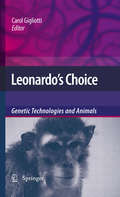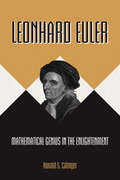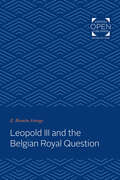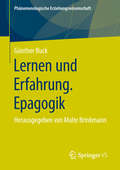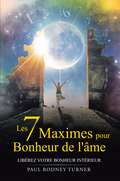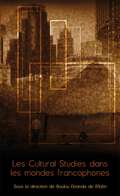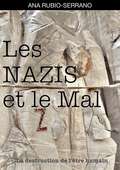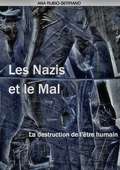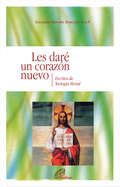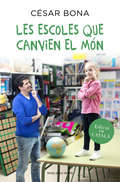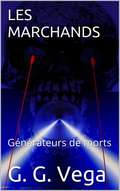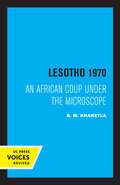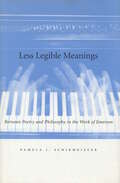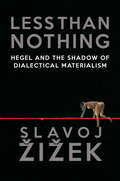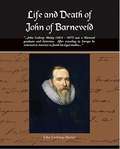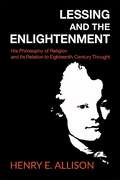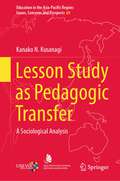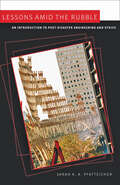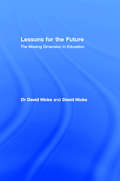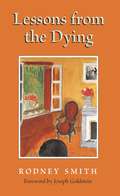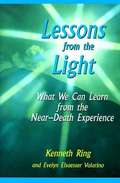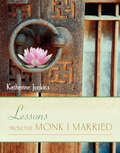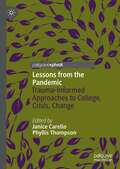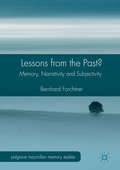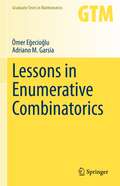- Table View
- List View
Leonardo’s Choice
by Carol GigliottiLeonardo's Choice: Genetic Technologies and Animals is an edited collection of twelve essays and one dialogue focusing on the profound affect the use of animals in biotechnology is having on both humans and other species. Communicating crucial understandings of the integrated nature of the human and non-human world, these essays, unlike the majority of discussions of biotechnology, take seriously the impact of these technologies on animals themselves. This collection's central questions revolve around the disassociation Western ideas of creative freedom have from the impacts those ideas and practices have on the non-human world. This transdisciplinary collection includes perspectives from the disciplines of philosophy, cultural theory, art and literary theory, history and theory of science, environmental studies, law, landscape architecture, history, and geography. Included authors span three continents and four countries. Included essays contribute significantly to a growing scholarship surrounding "the question of the animal" emanating from philosophical, cultural and activist discourses. Its authors are at the forefront of the growing number of theorists and practitioners across the disciplines concerned with the impact of new technologies on the more-than-human world.
Leonhard Euler
by Ronald S. CalingerThis is the first full-scale biography of Leonhard Euler (1707-83), one of the greatest mathematicians and theoretical physicists of all time. In this comprehensive and authoritative account, Ronald Calinger connects the story of Euler's eventful life to the astonishing achievements that place him in the company of Archimedes, Newton, and Gauss. Drawing chiefly on Euler's massive published works and correspondence, which fill more than eighty volumes so far, this biography sets Euler's work in its multilayered context--personal, intellectual, institutional, political, cultural, religious, and social. It is a story of nearly incessant accomplishment, from Euler's fundamental contributions to almost every area of pure and applied mathematics--especially calculus, number theory, notation, optics, and celestial, rational, and fluid mechanics--to his advancements in shipbuilding, telescopes, ballistics, cartography, chronology, and music theory.The narrative takes the reader from Euler's childhood and education in Basel through his first period in St. Petersburg, 1727-41, where he gained a European reputation by solving the Basel problem and systematically developing analytical mechanics. Invited to Berlin by Frederick II, Euler published his famous Introductio in analysin infinitorum, devised continuum mechanics, and proposed a pulse theory of light. Returning to St. Petersburg in 1766, he created the analytical calculus of variations, developed the most precise lunar theory of the time that supported Newton's dynamics, and published the best-selling Letters to a German Princess--all despite eye problems that ended in near-total blindness. In telling the remarkable story of Euler and how his achievements brought pan-European distinction to the Petersburg and Berlin academies of sciences, the book also demonstrates with new depth and detail the central role of mathematics in the Enlightenment.Some images inside the book are unavailable due to digital copyright restrictions.
Leopold III and the Belgian Royal Question
by E. Ramón ArangoOriginally published in 1963. Between 1945 and 1951, Belgium faced a crisis in political leadership when its ruling monarch, King Leopold III, was accused of violating the Belgian Constitution during World War II. The "question" at hand refers to the uncertainty over whether King Leopold III could return to Belgium as king. Leopold III and the Belgian Royal Question documents the history of this political crisis, culminating with the abdication of King Leopold and the assumption of the crown by Baudouin, Leopold's son.
Lernen und Erfahrung. Epagogik: Herausgegeben von Malte Brinkmann (Phänomenologische Erziehungswissenschaft #5)
by Günther Buck (verstorben)Günther Buck legt in dieser Studie eine phänomenologisch-hermeneutische Theorie des Lernens, des Beispiels und der Analogie vor, die für Pädagogik sowie für Sozial- und Kulturwissenschaften von grundlegender Bedeutung ist. Der Prozess der Erfahrung im Lernen wird in drei Momenten entfaltet: der epagogischen Gangstruktur, der antizipatorischen Horizonthaftigkeit und der dialektischen, „negativen“ Umwendung auf sich selbst. Lernen wird als Lernen aus Erfahrung und als Erfahrung kenntlich. Im zweiten und dritten Teil gelingt Buck eine Neubestimmung des Beispiels in seinen hermeneutischen, bildenden und didaktischen Funktionen. Unterschiedliche Typen der Analogie werden identifiziert und deren Funktionsweisen differenziert.Mit dieser Neuausgabe kann nach 30 Jahren das bekannteste und wirkungsmächtigste Buch von Günther Buck wieder zugänglich gemacht werden.
Les 7 maximes pour le bonheur de l'âme: Libérez votre bonheur intérieur
by Paul Rodney TurnerLES 7 MAXIMES POUR LE BONHEUR DE L’ÂME Libérez votre bonheur intérieur Apprenez à être heureux tout le temps Le bonheur est quelque chose que nous recherchons tous, que ce soit dans la nourriture, le sexe, les loisirs, les relations, les enfants, la carrière, les hobbies ou le sommeil. Le bonheur nous motive et définit effectivement la qualité de notre vie. On peut avoir une fortune immense mais si on n’est pas heureux alors généralement c’est qu’on a échoué dans la vie. Sans bonheur, la vie perd de sa valeur et, par conséquent, avec la baisse apparente de satisfaction, nous observons une augmentation du nombre de suicides à travers le monde. Dans un monde où les stimuli mentaux et physiques sont en abondance, il semble inconcevable qu’une personne puisse être malheureuse. Certes, tout le monde peut trouver une certaine forme de bonheur, mais malheureusement des tas de gens échouent et vivent leur vie tristes et exaspérés ou espèrent malgré tout qu’une lueur de joie apparaitra à l’horizon de leur destinée. Le bonheur est la nature de l’esprit, comme le dit le Vedānta-sūtra: ānanda-mayo 'bhyāsāt - “l’âme est par nature pleine de joie”. Cependant, en raison du fait que l’on confond souvent notre moi véritable avec la matière, nous perdons contact avec cet état naturel de béatitude et nous nous identifions à la douleur et la souffrance d’une forme physique. Quand une âme est prise au piège dans un corps matériel, elle s’identifie immédiatement aux relations physiques et oublie sa vraie identité en tant qu’être spirituel. Ce faux égo, influencé par les modalités de la nature matérielle, emprisonne l’âme dans un réseau d’actions et de réactions karmiques. Lorsque l’esprit est l’instrument qui sert à sentir, l
Les Cultural Studies dans les mondes francophones (Études culturelles, africaines et diasporiques)
by de B'béri, Boulou EbandaDepuis trois décennies le monde anglo-saxon a considéré sérieusement les Cultural Studies comme une analyse des pratiques quotidiennes et de la production de sens. Mais la production analytique en français dans cette discipline est restée presque absente. Les mondes francophones ont déjà vécu plusieurs événements qui auraient intéressé les Cultural Studies au XXIe siècle : les manifestations sociales de l’hiver 2006 et de l’automne 2007 en France, les mouvements migratoires d’Africains vers l’Europe et le débat sur « les accommodements raisonnables » au Québec entre autres. Pour tous ces événements, nous avions entendu s’élever plusieurs voix qui offraient des articulations généralistes de différentiation de nous à l’autre et des idiomes comme « ces gens-là », « les enfants issus d’immigration », « nous ne voulons pas accueillir la misère du monde » et bien d’autres. Nous n’avions pas entendu s’élever des perspectives provenant des Cultural Studies dans leur compréhension particulière d’événements politiques, ni en France, ni en Belgique, ni en Suisse, encore moins au Québec. Ces perspectives nous invitent à tenir compte des rapports entre discours et représentations, de placer les contextes politiques des pratiques quotidiennes comme prémisses de nos analyses, d’ouvrir les identités aux pratiques de production de sens et de revoir les groupes et formations identitaires. Cet ouvrage a pour but de souligner les repères utiles des Cultural Studies pour mieux comprendre les milieux politiques et culturels de la francophonie au XXIe siècle. Publié en français
Les Nazis et le Mal. La destruction de l'être humain
by Ana Rubio-SerranoLes Nazis et le Mal. La destruction de l'être humain par Ana Rubio-Serrano. (Nouvelle édition) Le Nazisme a ouvert la porte au terrorisme global. Il a dessiné un mal structurel où personne n'était sûre, pas même le peuple allemand. L'ennemi : tout celui pouvant penser par lui-même de façon libre et différente à ce que les règles nazies le dictaient. Les aryens n'étaient que des "individus créés", conçus pour la violence, c'est-à-dire, des automates intelligents déshumanisés. La socialisation du crime à travers la violence devenue en culture a été l'un des objectifs que l'on a pu établir dans les camps et dans la société. Bien que plus de soixante-cinq ans se sont écoulés depuis qu'Hitler monta au pouvoir en Allemagne, le sujet du Nazisme et de l'Holocauste est encore un des sujets pertinents, en gardant en vie les questions suivantes : Comment cela a-t-il pu arriver ? Et quelles sont les conséquences de ce qui a eu lieu ? Ces questions sont abordées dans "Les nazis et le mal, la destruction de l'être humain", publié par Éditorial UOC sous la marque Niberta et avec un prologue du Chaire en éthique à l'Université de Barcelone, Norbert Bilbeny. Ce qui est, d'abord, une question très vaste, est réduite à une enquête exhaustive de la notion du mal chez les hommes du Troisième Reich ou ce qui est équivalent au Même, le processus de comment les êtres humains deviennent méchants, ce qui se matérialise dans le Troisième Reich. On pourrait penser que le sujet concernant le Nazisme est déjà surchargé de références et qu'il serait difficile d'ajouter de nouveaux éléments à la réflexion sur cette question. Cependant, à peine quelques décennies représentent un bref intermède dans l'histoire dans son ensemble et la complexité du mal Nazi continue à nous troubler ; surtout, il est terrifiant d'être conscient du degré réel du mal atteint par des personnes qui, comme nous, vivaient dans de
Les Nazis et le Mal. La destruction de l’être humain
by Zaida Machuca Inostroza Ana Rubio-SerranoLes Nazis et le Mal. La destruction de l'être humain. par Ana Rubio-Serrano Le Nazisme a ouvert la porte au terrorisme global. Il a dessiné un mal structurel où personne n'était sûre, pas même le peuple allemand. L'ennemi : tout celui pouvant penser par lui-même de façon libre et différente à ce que les règles nazies le dictaient. Les aryens n'étaient que des "individus créés", conçus pour la violence, c'est-à-dire, des automates intelligents déshumanisés. La socialisation du crime à travers la violence devenue en culture a été l'un des objectifs que l'on a pu établir dans les camps et dans la société. Bien que plus de soixante-cinq ans se sont écoulés depuis qu'Hitler monta au pouvoir en Allemagne, le sujet du Nazisme et de l'Holocauste est encore un des sujets pertinents, en gardant en vie les questions suivantes : Comment cela a-t-il pu arriver ? Et quelles sont les conséquences de ce qui a eu lieu ? Ces questions sont abordées dans "Les nazis et le mal, la destruction de l'être humain", publié par Éditorial UOC sous la marque Niberta et avec un prologue du Chaire en éthique à l'Université de Barcelone, Norbert Bilbeny. Ainsi, le livre commence par décrire comment le Nazisme a introduit son pouvoir sur la société allemande grâce à sa forte structure. La globalisation du Mal est la première des quatre parties dans lesquelles le livre est divisé et dans ce livre, nous trouvons essentiellement une description détaillée du processus de la façon dont la société s'est plongée dans le mal/est devenue maligne, ce qui nous permet de parler de la médecine Nazie, la loi Nazie, le racisme antisémite élaboré, la dimension religieuse du nazisme et l'utilisation nazie de la langue. Nous lisons aussi comment, dans le but d'atteindre ses objectifs, le Nazisme savait très bien comment rassembler une variété de frustrations sociales - nous pourrions même les appeler "l
Les daré un corazón nuevo
by Eduardo Bonnín BarcelóContiene una colección de artículos, en los que el autor intenta mostrar que la teología moral católica no puede ser ni alienante ni opresiva, aunque a veces lo haya sido por desviarse del Evangelio. Su intención es procurar que el Pueblo de Dios pase de una moral legalista a una moral de la libertad de los hijos de Dios.
Les escoles que canvien el món
by César BonaEl nou llibre de César Bona ens convida a conèixer de primera mà alguns dels casos més meravellosos que estan succeint en l'àmbit educatiu, excel·lents exemples de que l'educació dels nostres fills, la manera d'ensenyar-los, es pot fer d'una altra manera i, el millor de tot: que funciona. Hi ha escoles que estan canviant l'educació. No són a Finlàndia ni a Suècia, són aquí. Unes són rurals i altres públiques, algunes tenen alumnes d'infantil i de primària, altres, a més, de secundària, de batxillerat o d'FP, però totes són «escoles Changemarker» i estan preparades per liderar una autèntica transformació educativa. César Bona ha viatjat a set ciutats i pobles seguint el camí d'algunes de les escoles que lluiten perquè cada nen i cada nena tingui l'oportunitat de convertir-se en un agent de canvi. Aquests centres compten amb alumnes motivats, mestres compromesos i pares còmplices. Escoles excel·lents des d'un punt de vista acadèmic, amb un projecte integral en el qual el respecte, la creativitat, la imaginació, el treball en equip, l'empatia, la interacció amb el barri i amb la societat són el millor camí per completar l'ensenyament de les assignatures tradicionals. L'autor ha entrevistat a mestres, pares i alumnes i ens narra, amb una veu personal i propera, els projectes que estan duent a terme, el que han aconseguit i com tots nosaltres, sigui quina sigui la nostra edat, podem aportar-hi molt. No hem d'oblidar que els nens no són els adults del demà, són els habitants del present. Si reforcem la seva creativitat natural, la seva imaginació desbordant, i treballem l'empatia, la solidaritat i el respecte, poden canviar el món. No en el futur, sinó ara. Perquè una nova educació no és un somni, és una realitat.
Les marchands
by Guido Galeano Vega Julien SaunierL’éducation appropriée de valeurs sociales humaines est la priorité dans le monde. N’importe qui ayant administré et mené l’économie mondiale, consciemment ou non, de manière intentionnelle ou non, est focalisé sur l’industrie de la mort sur la planète. Cela peut se percevoir par tous les évènements violents que notre génération, supposée évoluée, a souffert. En un siècle, des millions et des millions de ressources ont été gaspillées, et millions et des millions de personnes ont été tuées, en pleine force de l’âge. Apparemment, une partie de l’humanité a perdu l’amour de la vie, et se rue dans les bras de la mort, comme serviteur volontaire pour tuer. Ceux qui tuent sont ceux qui privent la société de recevoir les fruits positifs de la productivité globale. Ce sont ceux qui accumulent les fruits de l’effort et du sacrifice des autres. Ceux qui tuent sont ceux qui investissent les ressources de la planète dans l’industrie de la mort.
Lesotho 1970: An African Coup under the Microscope (Perspectives on Southern Africa #5)
by B.M. KhaketlaThis title is part of UC Press's Voices Revived program, which commemorates University of California Press’s mission to seek out and cultivate the brightest minds and give them voice, reach, and impact. Drawing on a backlist dating to 1893, Voices Revived makes high-quality, peer-reviewed scholarship accessible once again using print-on-demand technology. This title was originally published in 1972.
Less Legible Meanings: Between Poetry and Philosophy in the Work of Emerson
by Pamela J. SchirmeisterExamining both why and how Emerson evades the ancient quarrel between literature and philosophy, this book entirely rethinks the nature of Emerson's radical individualism and its relation to the possibility of an ethics and a politics. The author argues that the quarrel between literature and philosophy never took place in America, and that instead traditional philosophical work staged itself here as a form of literary praxis and cultural therapeutics. Epitomized in the work of Emerson, this praxis takes shape explicitly in Emerson's understanding of democracy and occurs as an exchange within the act of reading. This is the exchange that Emerson so eloquently calls for in "The American Scholar" under the name of "letters." Emerson's project for American letters is the creation of a new national identity; as Less Legible Meanings makes clear, we have not yet understood the full range of implications that this project entails. After situating American letters in relation to German and British Romanticism and the features of American culture that augmented and altered their reception in the United States, the book goes on to explore the type of reading that Emersonian rhetoric engenders. Both persuasive and tropological, this rhetoric elicits from the reader something similar to psychoanalytic transference. Its goal is to lead the reader to a point at which representational logic breaks down so that a new subject can take shape. The purpose of such rhetoric, however, extends well beyond personal self-creation, because the construction of the subject emerges as the very possibility of the passage from the private sphere to the public one. In this passage, our entire notion of liberal individualism must be rethought, and with it, the pragmatic question of Emersonian ethics and politics. A revisionary study of some of Emerson's central essays, Less Legible Meanings also invites the reader to reconsider the nature of Emerson's influence on contemporary American culture and to discover new ways in which we might continue to understand his work. Interdisciplinary in scope, the book makes equal use of the history of philosophy, psychoanalytic theory, and cultural history.
Less Than Nothing
by Slavoj ZizekFor the last two centuries, Western philosophy has developed in the shadow of Hegel, an influence each new thinker struggles to escape. As a consequence, Hegel's absolute idealism has become the bogeyman of philosophy, obscuring the fact that he is the defining philosopher of the historical transition to modernity, a period with which our own times share startling similarities. Today, as global capitalism comes apart at the seams, we are entering a new period of transition. In Less Than Nothing, the product of a career-long focus on the part of its author, Slavoj i ek argues it is imperative we not simply return to Hegel but that we repeat and exceed his triumphs, overcoming his limitations by being even more Hegelian than the master himself. Such an approach not only enables i ek to diagnose our present condition, but also to engage in a critical dialogue with key strands of contemporary thought--Heidegger, Badiou, speculative realism, quantum physics, and cognitive sciences. Modernity will begin and end with Hegel.From the Trade Paperback edition.
Lesser Hippias
by PlatoPlato studied under Socrates and was Aristotle's teacher. Together these three Greeks developed the basis of philosophical thinking for the entire Western world. Plato was also a writer, mathematician, and founder of the Academy in Athens, which was the first university in Europe. Lesser Hippias is also known as Hippias Minor. This is thought to be one of Plato's earlier works in which Socrates matches wits with the literary critic Hippias. From Wikipedia " Hippias believes that Homer can be taken at face value, and that Achilles may be believed when he says he hates liars. Socrates argues that Achilles is a cunning liar who throws people off the scent of his own deceptions, and that cunning liars are actually the "best" liars. Socrates proposes, possibly for the sheer dialectical fun of it, that it is better to do evil voluntarily than involuntarily. His case rests largely on the analogy with athletic skills, such as running and wrestling. He says that runner or wrestler who deliberately sandbags is better than the one who plods along because he can do no better. "
Lessing and the Enlightenment: His Philosophy of Religion and Its Relation to Eighteenth-Century Thought
by Henry E. AllisonAlthough only one aspect of Gotthold Ephraim Lessing's diverse oeuvre, his religious thought had a significant influence on thinkers such as Kant, Hegel, Kierkegaard, and present-day liberal Protestant theologians. His thought is particularly difficult to assess, however, because it is found largely in a series of essays, reviews, critical studies, polemical writings, and commentary on theological texts. Beyond these, his correspondence, and a few fragmentary essays unpublished during his lifetime, we have his famous drama of religious toleration, Nathan the Wise, and his philosophical-historical sketch, The Education of the Human Race. In these scattered texts, Lessing challenged the full range of theological views in the Enlightenment, from Protestant orthodoxy, with its belief in Biblical inerrancy, to a radical naturalism, which rejected both the concept of a divine revelation and the historically based claims of Christianity to be one, as well as virtually everything in between. Since he refused to identify himself with any of these parties, Lessing was an enigmatic figure, and a central question from his time to today is where he stood on the issue of the truth of the Christian religion. Now back in print, and with the addition of two supplementary essays, Henry E. Allison's book argues that, despite appearances, Lessing was not merely an eclectic thinker or intellectual provocateur, but a serious philosopher of religion, who combined a basically Spinozistic conception of God with a sophisticated pluralistic conception of religious truth inspired by Leibniz.
Lesson Study as Pedagogic Transfer: A Sociological Analysis (Education in the Asia-Pacific Region: Issues, Concerns and Prospects #69)
by Kanako N. KusanagiThis book examines education transfer, specifically focusing on pedagogic transfer, and analyzes what happens when lesson study is introduced into foreign contextual settings. Lesson study, a professional development approach that originated in Japan 150 years ago, has been widely considered one of the best practices for collaborative professional development. There is an underlying assumption behind education transfer that when “best practice” is transferred to another country, it will generate a similar effect and improve schooling quality. Since pedagogic practice is socially constructed, the best practice in one setting may not be meaningful in another contextual setting. This book makes a unique contribution to the field of comparative education by offering a sociological examination of why pedagogic transfer often fails to bring expected benefits. It is comprised of three parts. Part I, ”Pedagogic Transfer and Lesson study,” provides contextualized analysis of lesson study in Japan and abroad and presents how the meaning of practice is always reinterpreted against the local educational context. Part II presents a sociological analysis of Indonesian teachers’ practice based on ethnographic fieldwork. It conceptually analyses the nature of the teacher community and their practice and is presented as “teacher strategies.” The concept showed that teacher culture and practice are not fixed but constantly negotiated within the institutional setting.Part III, “Sociological Understanding of Pedagogic Transfer,” builds on the analyses in Part I and II and provides a theoretical understanding of the issue of pedagogic transfer. Professional responsibilities of teachers, collegiality, and teaching expertise in Japan and Indonesia are compared to understand how the meaning of lesson study was reconstructed in the Indonesian setting. In conclusion, recommendations for an alternative approach to professional development are offered.
Lessons amid the Rubble: An Introduction to Post-Disaster Engineering and Ethics (Johns Hopkins Introductory Studies in the History of Technology)
by Sarah K. PfatteicherThe aftermath of September 11, 2001, brought the subject of engineering-failure forensics to public attention as had no previous catastrophe. In keeping with the engineering profession's long tradition of building a positive future out of disasters, Lessons amid the Rubble uses the collapse of the World Trade Center towers to explore the nature and future of engineering education in the United States. Sarah K. A. Pfatteicher draws on historical and current practice in engineering design, construction, and curricula to discuss how engineers should conceive, organize, and execute a search for the reasons behind the failure of man-made structures. Her survey traces the analytical journey engineers take after a disaster and discusses the technical, social, and moral implications of their work. After providing an overview of the investigations into the collapse of the Twin Towers, Pfatteicher explores six related events to reveal deceptively simple lessons about the engineering enterprise, each of which embodies an ethical dilemma at the heart of the profession. In tying these themes together, Pfatteicher highlights issues of professionalism and professional identity infused in engineering education and encourages an explicit, direct conversation about their meaning.Sophisticated and engagingly written, this volume combines history, engineering, ethics, and philosophy to provoke a deep discussion about the symbolic meaning of buildings and other structures and the nature of engineering.
Lessons for the Future: The Missing Dimension in Education (Futures In Education Ser.)
by David Hicks Dr David HicksDrawing on the latest research in futures studies, this book provides new insights into ways of helping both students and teachers think more critically and creatively about their own future and that of wider society. It acknowledges the crucial role of education in helping young people understand the nature of local and global change and the social and environmental impacts such change will have on their future. Setting out a clear educational rationale for promoting global and futures perspective in education, it provides helpful and stimulating examples of futures-orientated classroom activities. It also includes fascinating research into children's views of the future.
Lessons from the Dying
by Joseph Goldstein Rodney SmithAre a person's perceptions and values altered when facing the end of life? Do the dying see the world in a way that could help the rest of us learn how to live? This book takes us into the lessons of the dying. Through the words and circumstances of the terminally ill, we become immersed in their wisdom and in our own mortality. The dying speak to us in direct and personal ways, pointing toward a wise and sane way to live. In everyday language we can all understand, Rodney Smith extends the conversation about death to people of all ages and states of health. Through exercises and guided meditative reflections at the end of each chapter, the lessons of the dying become a blueprint for our own growth.
Lessons from the Light
by Kenneth Ring Evelyn Elsaesser ValarinoWhile providing many accounts of near-death experiences (NDEs) from men, women, and children of all ages and backgrounds, Lessons from the Light is much more than just an inspiring collection of NDEs. In Lessons near-death expert Kenneth Ring extracts the pure gold of the NDE and with a beautiful balance of sound research and human insight reveals the practical wisdom held within these experiences. This material includes reports of out-of-body experiences, children's NDEs, blind people gaining sight during NDE episodes.
Lessons from the Monk I Married
by Katherine JenkinsLessons from the Monk I Marriedoffers up ten of the most powerful lessons about life, love, and spirituality that Katherine Jenkins has gathered during her marriage to former Buddhist monk Seong Yoon Lee. A seeker in the truest sense of the word, Jenkins went to Korea on a whim, hoping to find the answers to her deepest, most pressing questions about how to find peace and her purpose in life. During her first months there, she sought out a remote temple, where she unknowingly crossed paths with an unassuming Buddhist monk. Months later, they met again by chance-and fell in love. Though their courtship was long, mostly secretive, and fraught with logistical and spiritual considerations, Jenkins and Lee were ultimately married in Korea in 2003. Through their relationship, Jenkins discovered the most important lesson of all: No one holds the keys to peace and happiness-you have walk yourownpath and find yourownwisdom through yourownexperiences. More than the improbable story of a girl from Seattle who found peace of mind (and love) with a Buddhist monk,Lessons from the Monk I Marriedis an approachable guide to the most elemental spiritual questions of our day.
Lessons from the Pandemic: Trauma-Informed Approaches to College, Crisis, Change
by Phyllis Thompson Janice CarelloThis collection presents strategies for trauma-informed teaching and learning in higher education during crisis. While studies abound on trauma-informed approaches for mental health service providers, law enforcement, nurses, and K-12 educators, strategies geared to college faculty, staff, and administrators are not readily available and are now in high demand. This book joins a conversation in place about what COVID has taught us and how we are using what we have learned to construct a new discourse around teaching and learning during crisis.
Lessons from the Past?
by Bernhard ForchtnerThis book reconstructs how claims to know 'the lessons' from past wrongdoings are made useful in the present. These claims are powerful tools in contemporary debates over who we are, who we want to be and what we should do. Drawing on a wide range of spoken and written texts from Austria, Denmark, Germany and the United States, this book proposes an abstract framework through which such claims can be understood. It does so by conceptualising four rhetorics of learning and how each of them links memories of past wrongdoings to opposition to present and future wrongdoings. Drawing extensively on narrative theory, Lessons from the Past? reconstructs how links between past, present and future can be narrativised, thus helping to understand the subjectivities and feelings that these stories facilitate. The book closes by considering if and how such rhetorics might live up to their promise to know 'the lessons' and to enable learning, offering a revised theory of collective learning processes.
Lessons in Enumerative Combinatorics (Graduate Texts in Mathematics #290)
by Adriano M. Garsia Ömer EğecioğluThis textbook introduces enumerative combinatorics through the framework of formal languages and bijections. By starting with elementary operations on words and languages, the authors paint an insightful, unified picture for readers entering the field. Numerous concrete examples and illustrative metaphors motivate the theory throughout, while the overall approach illuminates the important connections between discrete mathematics and theoretical computer science. Beginning with the basics of formal languages, the first chapter quickly establishes a common setting for modeling and counting classical combinatorial objects and constructing bijective proofs. From here, topics are modular and offer substantial flexibility when designing a course. Chapters on generating functions and partitions build further fundamental tools for enumeration and include applications such as a combinatorial proof of the Lagrange inversion formula. Connections to linear algebra emerge in chapters studying Cayley trees, determinantal formulas, and the combinatorics that lie behind the classical Cayley–Hamilton theorem. The remaining chapters range across the Inclusion-Exclusion Principle, graph theory and coloring, exponential structures, matching and distinct representatives, with each topic opening many doors to further study. Generous exercise sets complement all chapters, and miscellaneous sections explore additional applications. Lessons in Enumerative Combinatorics captures the authors' distinctive style and flair for introducing newcomers to combinatorics. The conversational yet rigorous presentation suits students in mathematics and computer science at the graduate, or advanced undergraduate level. Knowledge of single-variable calculus and the basics of discrete mathematics is assumed; familiarity with linear algebra will enhance the study of certain chapters.
